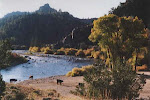The three largest hydraulic fracturing companies in the United States were given exemptions under the 2005 Energy Bill by Bush/Cheney. It was revealed during an investigation by Senator Waxman, et al in 2010, that these companies lied to Congress about using diesel fuel in their hydraulic fracturing operations. TODAY, rather than fining, let alone remediation, or removing diesel from this process, the EPA is setting up plans for a "permitting guide" (legalizing guide) for diesel in "fracking." This "legalizing through permitting" by our government is part and parcel of the regulatory system which allows industry to direct their harm from their industrial extraction and allows them to divert from the real issue at hand: hydraulic fracturing spews toxic chemicals into the air, water, and onto the land causing harm (illness, death, destruction of ecosystems, depletion of aquifers, et al) These actions alone for anyone other than the oil industry would be criminal actions. Instead, once again, industry is "given/permitted" so that they can do "business as usual" at the expense of the local community and nature. The public has no say in this regulatory process to determine what happens within their own communities.
The oil industry has been "playing" with Congress as well as misusing their exemptions to the "Safe Drinking Water Act" while they extract their resources.
Additionally, the focus has been on diesel fuel, but it is well known that the other chemicals in the hydraulic fracturing mix contain many of the same chemicals as in diesel fuel--laced with carcinogens and endocrine disruptors that cause health damage at any level of exposure. Note that all "permissible levels" set by the EPA are allowed for industry to "do business" rather than protect human and animal health.
Please read the attachment to understand the egregious liberties taken by industry, and allowed by our government, at the expense of the health and safety of every living creature on this Earth.
Below the article are some excerpts from this attachment.
April 26, 2011
EPA Administrator Lisa Jackson says the agency will develop guidance for the use of diesel fuel as a base fluid in hydraulic fracturing, or fracking, gas drilling operations -- a measure that could clarify legal uncertainty over whether and when the hotly contested practice is lawful and/or must be permitted.
Jackson told the 2011 U.S. Energy Information Administration conference April 26 that one of the holes in the agency's oversight of fracking operations is its regulation of diesel fuel as an additive to fracking fluid -- a practice that industry sometimes uses to prevent fracking fluid from seeping into some clay formations.
"The place where we do have a gap right now is on diesel injection," Jackson said, adding that the agency has now confirmed that industry has used diesel fuel in fracking operations. "We need to put some guidance out."
Jackson did not offer a timeline for when the agency planned on releasing such guidance, but said the move to take a closer look at some opportunities for EPA to provide direction on the injection of fracking fluids should come now, while EPA is preparing its pending two-year study on potential effects of fracking on drinking water.
Fracking is the practice of injecting fluid to fracture rock formations and release oil and gas. The practice has resulted in major new natural gas supplies coming on line, bolstering industry efforts to provide a cleaner-burning baseload fuel source for electricity generation than coal. But a recent study found that electricity produced from fracked gas may have a larger greenhouse gas footprint than coal-fired generation due to high levels of methane releases from fracking operations -- raising doubts about the Obama administration's plan to rely on natural gas as a bridge fuel for its clean energy standard.
Environmentalists and other industry critics are also concerned that the practice results in water contamination from discharges of produced water that contains chemicals used in fracking fluid as well as naturally occurring substances. Activists are also concerned that the injection of chemical-laced fluids underground results in groundwater contamination, though industry and state officials dispute this.
The 2005 energy law generally exempted fracking operations from EPA's underground injection control (UIC) permitting under the Safe Drinking Water Act (SDWA), though the law continued to subject the use of diesel in fracking fluid to permit requirements.....continued....











